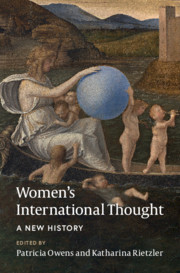Book contents
- Women’s International Thought: A New History
- Women’s International Thought: A New History
- Copyright page
- Contents
- List of Illustrations
- Contributors
- Preface and Acknowledgments
- Introduction: Toward a History of Women’s International Thought
- Part I Canonical Thinkers
- 1 Anna Julia Cooper on Slavery’s Afterlife: Can International Thought “Hear” Her “Muffled” Voice and Ideas?
- 2 Revolutionary Thinking: Luxemburg’s Socialist International Theory
- 3 Of Colonialism and Corpses: Simone Weil on Force
- 4 Ideas in Action: Eslanda Robeson’s International Thought after 1945
- Part II Outsiders
- Part III Thinking in or around the Academy
- Index
2 - Revolutionary Thinking: Luxemburg’s Socialist International Theory
from Part I - Canonical Thinkers
Published online by Cambridge University Press: 07 January 2021
- Women’s International Thought: A New History
- Women’s International Thought: A New History
- Copyright page
- Contents
- List of Illustrations
- Contributors
- Preface and Acknowledgments
- Introduction: Toward a History of Women’s International Thought
- Part I Canonical Thinkers
- 1 Anna Julia Cooper on Slavery’s Afterlife: Can International Thought “Hear” Her “Muffled” Voice and Ideas?
- 2 Revolutionary Thinking: Luxemburg’s Socialist International Theory
- 3 Of Colonialism and Corpses: Simone Weil on Force
- 4 Ideas in Action: Eslanda Robeson’s International Thought after 1945
- Part II Outsiders
- Part III Thinking in or around the Academy
- Index
Summary
This essay’s re-reading of Rosa Luxemburg’s international thought reintroduces us to a canonical thinker whose contributions have not yet received the recognition they deserve. Instead, Luxemburg has been infantilized by both Marxist and liberal traditions, traditions that she challenged for their exalting of national self-determination. Her most important contribution, however, relates to capitalism’s reliance on tapping into non-capitalist modes of production and exchange. This was central to her sophisticated understanding of imperialism. As Hutchings explains, to Luxemburg it would have been unsurprising that the world economy today continues to rely on bonded labor. But Luxemburg’s positionality as an international thinker is also relevant to histories of international thought. Hers was a life steeped in political activism within the imperialist core, and her analysis of international politics contended with the religious, class, ethnic and racial hierarchies of the land-based empires of pre-World War I Eastern and Central Europe.
- Type
- Chapter
- Information
- Women's International Thought: A New History , pp. 52 - 71Publisher: Cambridge University PressPrint publication year: 2021

